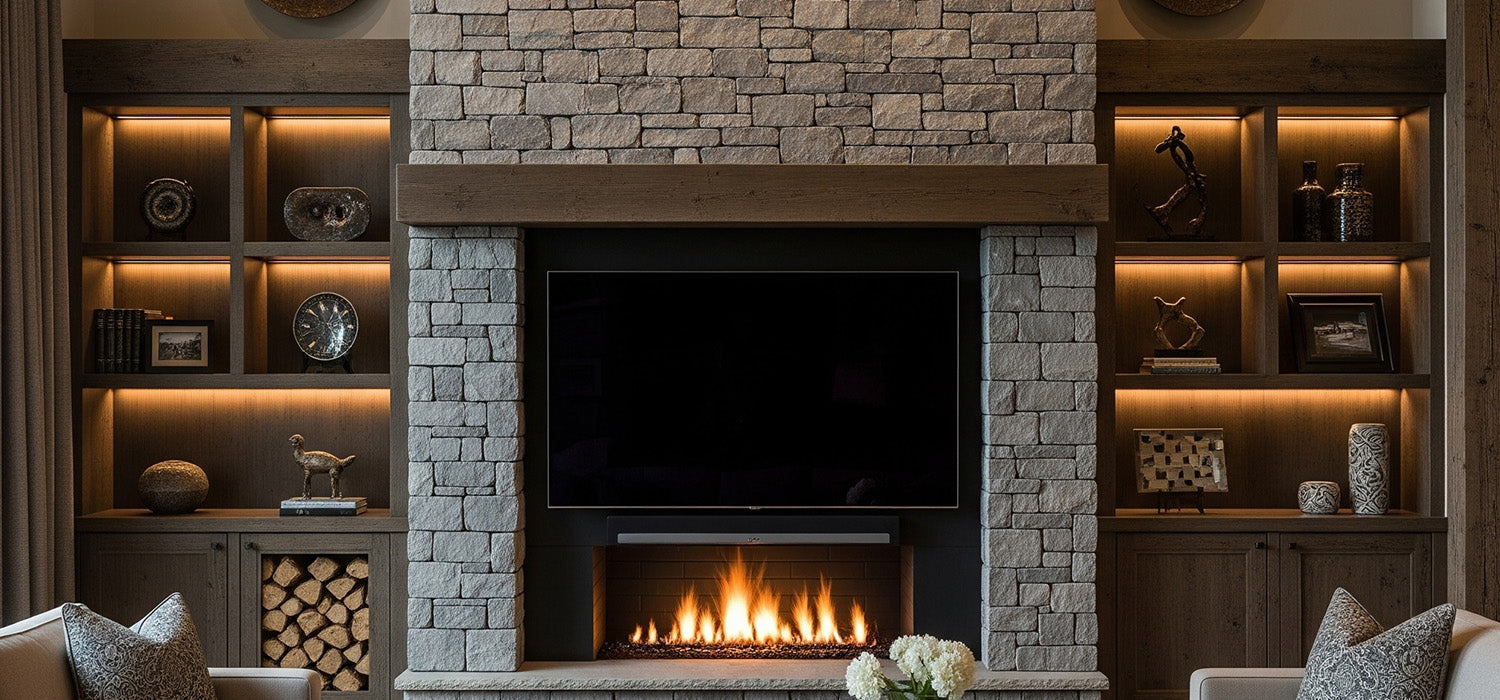
How to Build a Media Wall on a Chimney Breast (UK Guide)
Yes, you can build a media wall on a chimney breast—and it can look amazing! Whether you're hiding wires or dreaming of a sleek Media Wall Fire, this transformation mixes old-school charm with modern style. Want tips, ideas, and must-know safety checks? Keep reading to level up your living room!
Understanding the Chimney Breast as a Base
Before you start mounting your telly and sketching out floating shelves, it’s worth understanding exactly what your chimney breast is made of—and whether it’s ready for a makeover.
Structural Integrity of Chimney Breasts
Chimney breasts are more than decorative lumps in the wall. In many homes, they’re load-bearing parts of the structure—especially in older properties where open fireplaces once did the heavy lifting (and heating).
So if you’re thinking of attaching a media wall to one, you’ll want to be sure it’s up to the job.
Solid vs. Disused Chimney Breasts
A solid chimney breast, built with brick or stone, usually offers a sturdy and reliable surface. These are common in Victorian or Edwardian homes.
Disused chimney breasts—often capped or blocked off—might seem simpler to work with, but that doesn't mean you can skip structural checks. A quick inspection could reveal cracked mortar, loose bricks, or damp hiding behind the plaster.
Load-Bearing Capacity
You don’t need to be a structural engineer—but you do need to call one if you're unsure.
If your chimney breast supports the floor above (as many do), adding a heavy TV or framework could cause issues. Reinforcement may be needed to make sure the structure holds up over time.
Heat Considerations (Even for Disused Chimneys)
Even if the fireplace hasn’t been used in years, old chimneys can surprise you.
Residual Heat and Flue Paths
Some chimneys still carry residual heat from nearby flues—or hold warm air that rises through the building. If you’re sealing it off or covering it, you’ll want to make sure it’s properly ventilated.
Blocking off a flue without thought could lead to condensation, musty smells, or worse—damp in your brand new feature wall.
Impact on Electronics
TVs and electronics are sensitive to heat. If there's still warmth coming through the chimney breast, it could shorten your TV’s lifespan—or worse, cause malfunctions.
Adding insulation or heat protection (like a thermal board) behind the screen can be a smart move.
Key Planning and Design Elements
This is where the fun begins—time to sketch, plan and dream up your perfect set-up.
Maximising the Available Depth
Chimney breasts don’t always have the depth you’d like for built-in storage or large screens, but with a bit of creativity, you can make the most of what’s there.
Creating Recessed Areas for TV and Storage
You can frame out the chimney breast slightly to create a recessed TV mount. Not only does this look sleek, but it also gives space for wiring and hidden lighting.
Add slimline shelves or floating units underneath for consoles, remotes, and those all-important snack drawers.
Flanking the Chimney Breast with Built-ins
Boxing out both sides of the chimney breast with shelving or cupboards creates symmetry and bonus storage.
It’s also a brilliant way to balance out the room—especially in period properties where proportions can be a bit quirky.
Aesthetic Integration
Let’s face it—if you’re building a media wall, you want it to look stunning. Not like you’ve just stuck a telly on an old fireplace.
Making the Chimney Breast the Focal Point
Paint it a bold colour, add slatted wood panelling, or go for textured wallpaper. Whatever your style, highlight the chimney breast rather than hiding it.
A bit of contrast can make your media wall feel like a true design feature.
Harmonising with the Existing Fireplace
Still have a working fireplace below? Brilliant.
Use complementary materials or finishes to tie everything together. Whether it’s a black stove, white marble surround, or something rustic, match the media wall so it feels intentional, not improvised.
Building a Media Wall Directly onto the Chimney Breast
Once your design’s sorted, it's time to roll up your sleeves—or call in the experts.
Assessing the Chimney Breast Condition
Before drilling anything, give the chimney breast a proper once-over.
Checking for Cracks, Damp, or Instability
Small hairline cracks are common, but bigger ones—or signs of damp—need attention.
Use a moisture metre or have a builder check behind the plaster. A quick skim coat won’t fix deep-rooted issues, so sort them now rather than post-install.
Sealing and Preparing the Surface
Clean the surface and make sure it’s dry, dust-free, and sealed. A well-prepped chimney breast means your fixings will hold, and paint or cladding will look flawless.
Framing and Securing the Structure
The framework is the backbone of your media wall—it has to be strong, level, and securely fixed.
Attaching Framework to Masonry (Appropriate Fixings)
Use masonry plugs or concrete screws designed for heavy loads. If you’re mounting a large TV and shelves, you’ll need brackets or timber strong enough to take the weight.
Building Out from the Chimney Breast
Need more depth? You can frame out around the breast to build a new front face. This is a common technique when adding electric fires or LED lighting strips.
Managing Heat and Ventilation
Overheating is one of the most common issues in DIY media walls—especially when tech is tightly boxed in.
Creating Voids for Airflow
Leave gaps behind your TV and in any compartments housing electronics. You might not see them, but your devices will thank you.
Using Non-Combustible Materials Where Necessary
Anywhere near heat—especially an electric fire—should be lined with fire-rated plasterboard or cement board. It keeps your set-up safe and compliant.
Incorporating a TV and Fireplace on a Chimney Breast
Yes, you can have both—and no, it won’t look too busy if done right.
TV Placement Above Fireplace
This layout looks brilliant but can cause neck strain if you're not careful.
Optimal Viewing Height and Neck Strain
Try to keep the TV at or just above eye level when seated. If that’s too high above the fire, consider tilting brackets to help with viewing comfort.
Heat Dissipation for TV
If there’s a fire below, a mantel or heat deflector can stop rising warmth from reaching your screen.
Electric Fire Integration
Electric fires are a top pick for media walls—safe, stylish, and easy to fit.
Creating a Recess for an Electric Fire
Frame a cavity that fits your chosen model snugly. Check measurements twice before building—millimetres matter.
Ensuring Ventilation for the Electric Fire
Your fire may need airflow from below or behind. Always follow the manufacturer’s clearance guidelines and keep ventilation grilles clear.
Potential Challenges and Solutions
Every project has hiccups—but most are fixable with a bit of forward planning.
Uneven Surfaces and Plasterwork
Older chimney breasts can be lumpy or uneven. Use battens and shims to level your frame before attaching any visible panels or units.
Routing Cables Within the Masonry
Don’t chase into brick unless absolutely necessary. Instead, run cables behind your false wall or through conduit for easy upgrades later.
Access for Chimney Maintenance
Still using your chimney or planning to in the future? Leave access panels or allow space for sweeping and checks—it’ll save you a major headache later.
Conclusion: A Stunning and Functional Feature on Your Chimney Breast
So, can a media wall be built on a chimney breast? Absolutely—and it can look incredible.
From smart storage to integrated fires, it's a brilliant way to blend old and new, form and function. With a little planning, the right materials, and a clear design vision, your chimney breast can become the centrepiece of the whole room.
Ready to give yours a glow-up? With the right approach, a Media Wall Fire might just be the cosiest upgrade you’ve ever made.
Other content we think you'll love
- Can I Build a Media Wall Myself? A DIY Guide for UK Homes
- How to Build a Stylish Media Wall with TV & Fireplace
- Can You Build a Media Wall Over a Radiator? A Stylish Guide
- Can You Build a Media Wall on Carpet? Tips for a Stable Setup
- Can You Build a Media Wall Around a Fireplace? A Cosy & Stylish Upgrade
- Can You Build a Media Wall in a Council House? A Practical Guide
- The Ultimate Guide to Buying a Pre-Made Media Wall in the UK
- How to Attach Plasterboard to a Media Wall: A Step-by-Step Guide
- How Deep Should Your Media Wall Be? A Guide to Perfect Fit & Function
- Are Media Wall Fires Safe? What Every UK Homeowner Should Know
- Can You Build a Media Wall Without Plastering?
- How is a Media Wall Built? A Step-by-Step DIY Guide
- MDF vs Plasterboard for Media Walls: Which Should You Choose?
- What Are the Disadvantages of Media Walls? A Cautionary Guide
- What is a Media Wall? The Ultimate Living Room Glow-Up

